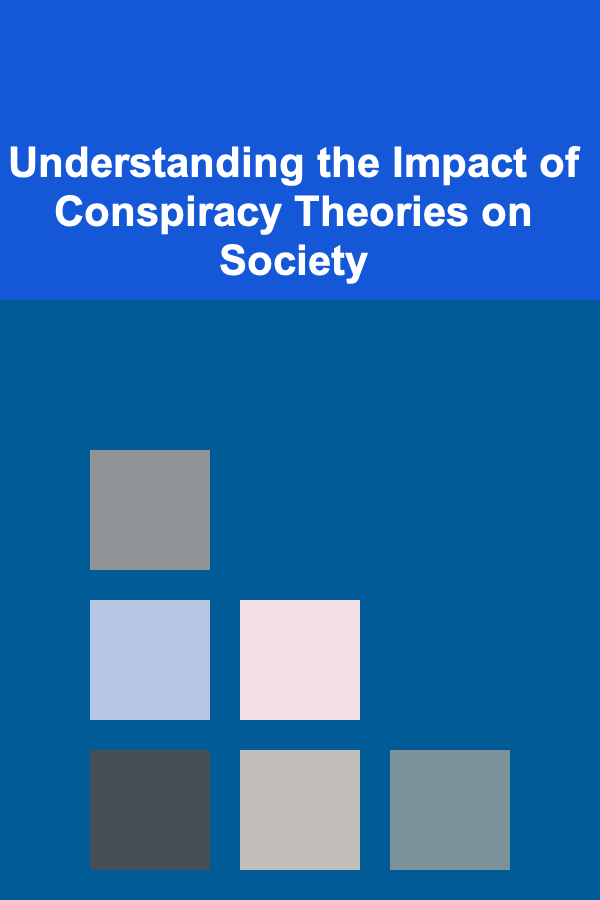
Understanding the Impact of Conspiracy Theories on Society
ebook include PDF & Audio bundle (Micro Guide)
$12.99$5.99
Limited Time Offer! Order within the next:

Conspiracy theories, narratives that attribute significant events or situations to secret plots by powerful individuals or groups, have been a persistent feature of human societies throughout history. While seemingly relegated to the fringes of public discourse at times, they have repeatedly surged into mainstream consciousness, particularly during periods of social upheaval, political instability, and rapid technological change. Understanding the impact of conspiracy theories on society requires a nuanced approach that considers their historical context, psychological underpinnings, communication pathways, and the evolving media landscape in which they thrive.
The Psychology of Conspiracy Theories: Why We Believe
At the heart of understanding the societal impact of conspiracy theories lies the need to comprehend why individuals are drawn to them in the first place. Psychological research suggests several key factors contributing to this phenomenon:
- The Need for Understanding and Control: Conspiracy theories often provide a simplified, albeit often inaccurate, explanation for complex and unsettling events. In a world characterized by uncertainty and information overload, these narratives can offer a sense of order and control by attributing causality to identifiable actors and motives. This is particularly appealing when official explanations are perceived as incomplete, opaque, or untrustworthy. The illusory pattern perception -- the tendency to find patterns even in random data -- also plays a role. Believers see connections where none exist, further reinforcing their convictions.
- Epistemic Motives: Beyond simply wanting to understand the world, individuals are driven by epistemic motives, including the desire to feel certain and accurate in their beliefs. Conspiracy theories can fulfill these needs by providing readily available answers and a sense of cognitive closure. Disagreement with these answers can be easily dismissed as the result of being "blinded" by the conspiracy. Confirmation bias then reinforces these beliefs, leading to a rejection of contradictory evidence.
- Social Motives: Belief in conspiracy theories can also be driven by social motives. These include the desire to feel unique and special by possessing "inside" knowledge that others lack, as well as the desire to protect one's social group from perceived threats. Conspiracy theories can foster a sense of shared identity and belonging among believers, creating a strong in-group/out-group dynamic.
- Existential Motives: The need for safety and security is a fundamental human drive. Conspiracy theories can provide a framework for understanding potential threats and, paradoxically, offer a sense of control over them. By identifying a source of danger, even if it's a shadowy cabal, individuals may feel better equipped to protect themselves and their loved ones. Moreover, conspiracy theories can help manage feelings of anxiety and powerlessness in the face of large-scale events.
- Distrust in Institutions and Authority: A decline in trust in government, media, scientific institutions, and other traditional authority figures is a significant factor in the rise of conspiracy thinking. When individuals feel that they are not receiving honest information from these sources, they may be more inclined to seek alternative explanations, regardless of their veracity. This distrust can stem from a variety of factors, including historical events, political polarization, and perceived corruption.
The Communication of Conspiracy Theories: How They Spread
The spread of conspiracy theories has been dramatically amplified by the advent of the internet and social media. These platforms provide a fertile ground for the dissemination of misinformation and disinformation, allowing conspiracy narratives to reach a vast audience quickly and efficiently. Several factors contribute to this accelerated spread:
- Social Media Algorithms: Algorithms designed to maximize user engagement can inadvertently promote conspiracy theories by creating filter bubbles and echo chambers. Users are often exposed to content that confirms their existing beliefs, reinforcing their convictions and limiting their exposure to alternative perspectives. This can lead to a radicalization effect, where individuals become increasingly entrenched in their beliefs and less receptive to contradictory information.
- The Power of Social Networks: Conspiracy theories often spread through social networks, where individuals are more likely to trust information shared by friends, family members, and acquaintances. This can create a sense of social validation, making it more difficult to challenge or debunk these narratives. Moreover, the desire to maintain social harmony within a group can discourage individuals from expressing dissenting opinions.
- The Role of Influencers: Conspiracy theories are often promoted by influential figures, such as celebrities, politicians, and online personalities, who can leverage their platforms to reach a large audience. These influencers may not necessarily be deeply invested in the conspiracy theories themselves, but they may find them useful for attracting attention, generating controversy, or promoting a particular agenda.
- The Visual Appeal of Conspiracy Theories: Memes, videos, and other visual content can be particularly effective in spreading conspiracy theories. These formats are often highly engaging and easily shareable, allowing them to reach a wide audience with minimal effort. Visuals can also be manipulated to distort information and create a false sense of credibility.
- The Deliberate Spread of Disinformation: It is important to acknowledge that some conspiracy theories are deliberately spread by malicious actors with the intent to sow discord, undermine trust in institutions, or promote a particular political agenda. These actors may use sophisticated techniques, such as bot networks and fake social media accounts, to amplify their message and create a false sense of widespread support.
The Societal Impact of Conspiracy Theories: A Multifaceted Threat
The impact of conspiracy theories on society is far-reaching and can have significant consequences across various domains. These include:
- Erosion of Trust: Conspiracy theories erode trust in institutions, experts, and mainstream sources of information. This can lead to a decline in civic engagement, a reluctance to participate in public health initiatives, and a general sense of cynicism about the world. When individuals lose faith in established institutions, they may be more susceptible to manipulation and propaganda.
- Political Polarization: Conspiracy theories can exacerbate political polarization by reinforcing existing biases and creating deeper divisions between different groups. These narratives often target specific political figures or ideologies, fueling animosity and making it more difficult to find common ground. The weaponization of conspiracy theories for political gain has become increasingly prevalent in recent years.
- Incitement to Violence: In extreme cases, conspiracy theories can incite violence and extremism. Individuals who believe that they are fighting against a powerful and malevolent force may be more likely to resort to violence in order to protect themselves or their community. Numerous instances of real-world violence have been directly linked to conspiracy theories, highlighting the potential for these narratives to have deadly consequences.
- Public Health Risks: Conspiracy theories about vaccines, medical treatments, and other public health interventions can pose a significant risk to public health. These narratives can discourage individuals from seeking medical care, adhering to public health guidelines, and getting vaccinated, leading to outbreaks of preventable diseases and increased mortality rates. The COVID-19 pandemic has provided a stark example of the dangers of vaccine-related conspiracy theories.
- Disruption of Democratic Processes: Conspiracy theories can undermine democratic processes by spreading misinformation about elections, political candidates, and voting procedures. This can lead to voter suppression, decreased voter turnout, and a general erosion of faith in the integrity of the electoral system. The spread of false claims about election fraud has become a major concern in many countries.
- Economic Consequences: Conspiracy theories can have economic consequences by disrupting businesses, discouraging investment, and creating uncertainty in the marketplace. For example, conspiracy theories about 5G technology have led to attacks on cell towers and disruptions in telecommunications services. The spread of false information about financial markets can also lead to instability and losses for investors.
- Damage to Personal Relationships: Belief in conspiracy theories can strain personal relationships and create conflict within families and communities. Individuals who are deeply invested in these narratives may find it difficult to maintain relationships with those who do not share their beliefs. The constant bombardment of conspiracy theories can lead to social isolation and alienation.
Addressing the Impact of Conspiracy Theories: A Multi-pronged Approach
Combating the negative impact of conspiracy theories on society requires a multifaceted approach that addresses the underlying psychological, social, and technological factors that contribute to their spread and appeal. Several strategies can be employed:
- Promoting Critical Thinking Skills: Education is a key tool in combating the spread of conspiracy theories. Promoting critical thinking skills, media literacy, and information evaluation can help individuals to distinguish between credible sources of information and misinformation. This includes teaching individuals how to identify logical fallacies, assess evidence, and evaluate the credibility of sources.
- Building Trust in Institutions: Restoring trust in institutions is essential for combating the appeal of conspiracy theories. This requires transparency, accountability, and a commitment to providing accurate and reliable information to the public. Governments, media organizations, and other institutions must work to rebuild public trust by demonstrating integrity and responsiveness.
- Countering Misinformation Online: Social media platforms have a responsibility to combat the spread of misinformation and disinformation on their platforms. This includes implementing effective content moderation policies, promoting fact-checking initiatives, and demoting content that promotes conspiracy theories. However, it is important to avoid censorship and to protect freedom of speech.
- Engaging in Constructive Dialogue: Rather than simply dismissing or ridiculing those who believe in conspiracy theories, it is important to engage in constructive dialogue and to try to understand their perspectives. This can involve asking open-ended questions, listening empathetically, and providing evidence-based information in a respectful and non-judgmental manner. However, it is also important to set boundaries and to avoid engaging in arguments that could escalate the situation.
- Strengthening Social Bonds: Conspiracy theories can thrive in environments where individuals feel isolated and disconnected from their communities. Strengthening social bonds and promoting a sense of belonging can help to mitigate the appeal of these narratives. This can involve encouraging participation in community activities, promoting social connections, and addressing social inequalities.
- Supporting Mental Health Services: Belief in conspiracy theories can sometimes be a symptom of underlying mental health issues. Providing access to mental health services and addressing issues such as anxiety, depression, and social isolation can help to reduce the vulnerability of individuals to these narratives.
- Fact-Checking and Debunking: Fact-checking organizations play a crucial role in debunking conspiracy theories and providing accurate information to the public. These organizations work to verify claims, identify false information, and provide evidence-based rebuttals. It is important to support and promote the work of fact-checking organizations.
- Working with Influencers: Engaging with trusted influencers to promote accurate information and debunk conspiracy theories can be an effective way to reach a wider audience. Influencers can use their platforms to share evidence-based information, promote critical thinking skills, and encourage individuals to question the narratives they encounter online.
- Legal and Regulatory Frameworks: In some cases, legal and regulatory frameworks may be necessary to address the deliberate spread of disinformation and incitement to violence. However, it is important to carefully consider the potential impact on freedom of speech and to ensure that any such measures are proportionate and narrowly tailored.
Conclusion
Conspiracy theories are a complex and multifaceted phenomenon that can have a significant impact on society. Understanding their psychological underpinnings, communication pathways, and societal consequences is essential for developing effective strategies to mitigate their negative effects. By promoting critical thinking skills, building trust in institutions, countering misinformation online, engaging in constructive dialogue, and strengthening social bonds, we can create a more resilient and informed society that is less vulnerable to the allure of conspiracy narratives. The challenge requires a collaborative effort involving individuals, communities, institutions, and social media platforms to ensure a future where evidence-based reasoning prevails over baseless speculation and harmful misinformation.
Reading More From Our Other Websites
- [Home Cleaning 101] How to Clean Your Home Efficiently Without Overwhelming Yourself
- [Home Storage Solution 101] How to Make the Most of Your Small Space with Hidden Storage
- [Beachcombing Tip 101] How to Conduct a Night‑Time Beachcombing Survey for Luminescent Organisms
- [Home Security 101] How to Access Your Home Security Remotely: A Step-by-Step Guide
- [Personal Finance Management 101] How to Improve Your Financial Literacy and Make Smarter Decisions
- [Organization Tip 101] How to Achieve a Like-New Look for Your Siding with a Pressure Washer
- [Home Cleaning 101] How to Clean Grout Like a Boss: Restoring Your Tile's Original Sparkle
- [Gardening 101] The Best Garden Blog Ideas for Sharing Your Green Thumb
- [Home Maintenance 101] How to Choose a Handyman for Home Maintenance Tasks
- [Home Budget 101] How to Budget for Taxes: Avoiding Last-Minute Stress

How to Implement a Capsule Wardrobe System
Read More
How to Organize a Family Reunion for Seniors
Read More
How to Stay on Track with Your Home Budget During an Emergency
Read More
How to Use the Power of Compound Interest in Your Investment Strategy
Read More
Why You Should Consider Minimalism for Better Organization
Read More
Cultivating Temperance in All Things: A Journey Towards Balance and Fulfillment
Read MoreOther Products

How to Implement a Capsule Wardrobe System
Read More
How to Organize a Family Reunion for Seniors
Read More
How to Stay on Track with Your Home Budget During an Emergency
Read More
How to Use the Power of Compound Interest in Your Investment Strategy
Read More
Why You Should Consider Minimalism for Better Organization
Read More